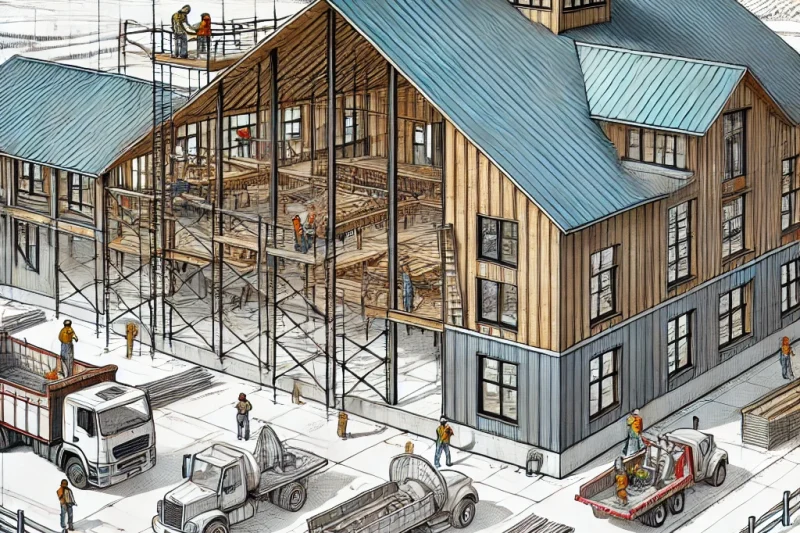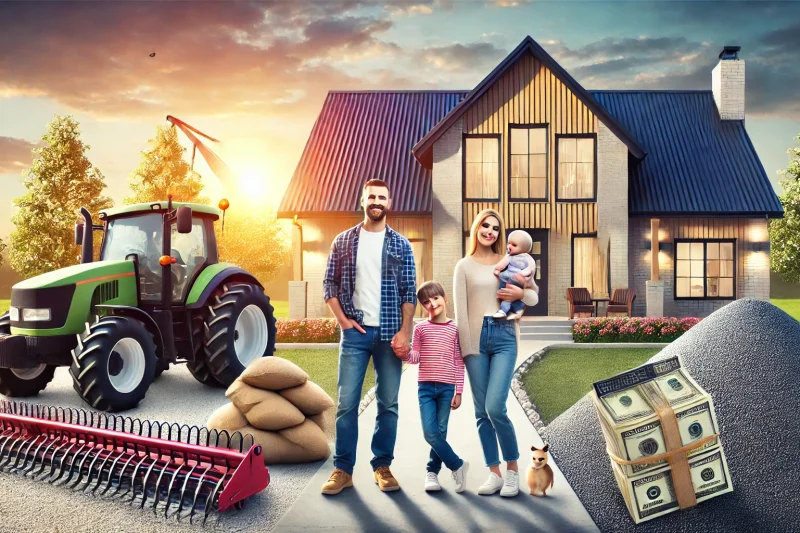Buy with No Money Down in Skokie, IL
“Learn about the Benefits of the Skokie, IL USDA home loan with Smart Mortgage!”
Skokie, Illinois USDA Loan Benefits
The Skokie, IL USDA home loan program, designed to assist rural homebuyers, offers several significant benefits. Here’s a guide outlining its key advantages:
- No Down Payment Required: One of the most significant benefits of the Skokie, IL USDA loan is that it does not require a down payment. This feature makes homeownership more accessible to many who may struggle to save for a large down payment.
- Lower Interest Rates: Typically, USDA loans come with interest rates that are lower than conventional loans. This can result in significant savings over the life of the loan.
- Lower Mortgage Insurance Costs: Compared to other loan types like FHA or conventional loans, USDA loans often have lower mortgage insurance costs. This reduces the overall monthly payment and can make housing more affordable.
- Flexible Credit Guidelines: USDA loans have more lenient credit requirements compared to conventional loans. This is beneficial for buyers with less-than-perfect credit histories.
- 100% Financing: Since there’s no down payment required, Skokie, IL USDA loans offer 100% financing. This is particularly helpful for buyers who have good income but limited savings for a down payment.
6. Fixed-Rate Mortgages: USDA loans are typically fixed-rate mortgages, which means the interest rate remains the same throughout the life of the loan. This predictability is beneficial for budgeting and financial planning.
7. Assistance for First-Time and Repeat Buyers: The program is available not only to first-time homebuyers but also to those who are buying a home for the second time or more, as long as they meet the eligibility criteria.
8. Geographical Flexibility: Although designed for rural areas, the definition of “rural” includes many areas around Skokie, IL as well. This offers a broader range of locations for potential homeowners.
Questions Call (888)416-4805
Get cash from your home.
Apply to see how a Skokie, IL cash out refinance can help you.
Homebuyer Seminars
Discover the keys to homeownership at our Skokie USDA home buying seminar – your first step towards securing your dream home!
See our home loans.
Explore our diverse range of Skokie, IL home loan programs tailored to fit your unique needs!
9. Potential for Property Repairs and Improvements: In some cases, USDA loans in Skokie, IL can be used to purchase and repair a home. This is particularly advantageous for buyers looking at homes that may need some TLC.
10. No Maximum Purchase Price: Unlike some other loan programs, USDA loans do not have a maximum purchase price limit. However, the borrower’s ability to repay the loan is considered.
11. Streamlined Refinancing Options: For those who already have a USDA loan, the refinancing process is streamlined, making it easier and faster to reduce interest rates and monthly payments.
We Service the Following Areas in Illinois:
Do you need a Pre-Approval?
Get a same day USDA pre-approval to shop for your dream home!
Mortgage Resource Center

USDA Loans in Illinois: Benefits, Eligibility, and Popular Cities
Buying a home is a significant milestone, and for many, finding the right loan program makes all the difference. If you're considering Read more
Barndominium Financing Made Easy with iLoanUSDA
Barndominium Financing Made Easy with iLoanUSDA: Your One-Time Construction Loan Solution Barndominiums, the stylish and practical combination Read more
Learn more about Skokie, Illinois
Skokie (/ˈskoʊki/; formerly Niles Center) is a village in Cook County, Illinois, United States, neighboring the City of Chicago’s northern border. Skokie’s population, according to the 2020 census, is 67,824. Skokie lies approximately 15 miles (24 km) north of Chicago’s downtown Loop. The name Skokie comes from a Potawatomi word for “marsh”. For many years, Skokie promoted itself as “The World’s Largest Village”. Skokie’s streets, like that of many suburbs, are largely a continuation of the Chicago street grid, and the village is served by the Chicago Transit Authority, further cementing its connection to the city.
Skokie was originally a German-Luxembourger farming community, but was later settled by a sizeable Jewish population, especially after World War II. At its peak in the mid-1960s, 58% of the population was Jewish,[failed verification] the largest proportion of any Chicago suburb. Skokie still has many Jewish residents (now about 30% of the population) and over a dozen synagogues. It is home to the Illinois Holocaust Museum and Education Center, which opened in northwest Skokie in 2009.
Skokie has twice received national attention for court cases decided by the United States Supreme Court. In the mid-1970s, it was at the center of National Socialist Party of America v. Village of Skokie, in which a Nazi group, backed by the American Civil Liberties Union, invoked the First Amendment in an attempt to schedule a Nazi rally in Skokie. At the time, Skokie had a significant population of Holocaust survivors. Skokie ultimately lost that case, though the rally was never held.
In 1888, the community was incorporated as Niles Centre. About 1910, the spelling was Americanized to “Niles Center”. However, the name caused postal confusion with the neighboring village of Niles. A village-renaming campaign began in the 1930s. In a referendum on November 15, 1940, residents chose the Native American name “Skokie” over the name “Devonshire”.
During the real estate boom of the 1920s, large parcels were subdivided; many two- and three-flat apartment buildings were built, with the “Chicago”-style bungalow a dominant architectural specimen. Large-scale development ended as a result of the Great Crash of 1929 and consequent Great Depression. It was not until the 1940s and the 1950s, when parents of the baby boom generation moved their families out of Chicago, that Skokie’s housing development began again. Consequently, the village developed commercially, an example being the Old Orchard Shopping Center, currently named Westfield Old Orchard.









